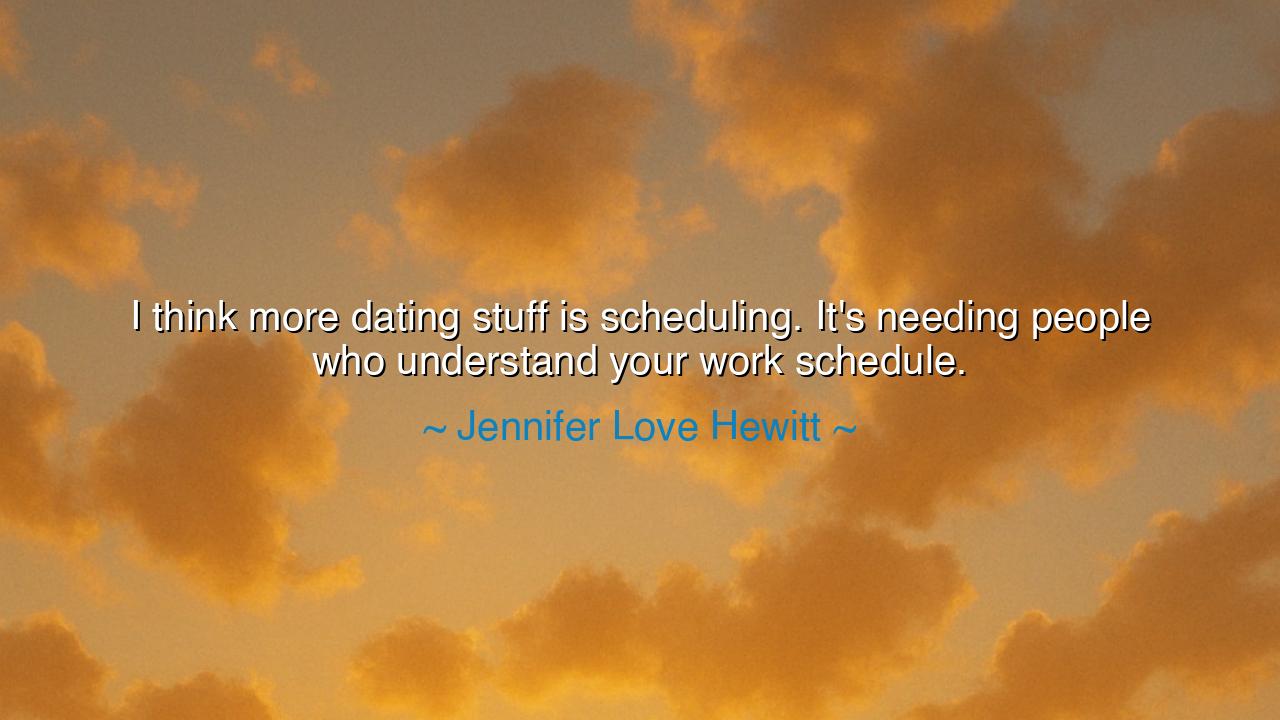
I think more dating stuff is scheduling. It's needing people who
I think more dating stuff is scheduling. It's needing people who understand your work schedule.






When Jennifer Love Hewitt said, “I think more dating stuff is scheduling. It’s needing people who understand your work schedule,” her words, though spoken in the tone of modern life, carry a truth as ancient as love itself — the truth that harmony in relationships is born not from passion alone, but from understanding. Beneath the surface of her practical observation lies a profound reflection on the human condition: that love cannot thrive in chaos, nor endure without empathy. It is a reminder that affection is not only a matter of the heart, but also of time — that two lives can only truly meet when they move in rhythm with each other.
In this age, her statement seems simple, even mundane. Yet, the ancients would have recognized its wisdom. For in every generation, lovers have struggled not only against distance, but against time itself — that invisible force which governs human life. The heart may burn with longing, but if the hours of one’s life cannot align with another’s, love becomes like two ships crossing at sea, their lights meeting briefly before vanishing into the dark. What Hewitt expresses is not merely the plight of modern romance, but the eternal truth that connection requires balance, and that love must be woven into the pattern of one’s daily life, not merely dreamed of in stolen moments.
To “find people who understand your work schedule” is to seek those who honor not only your feelings, but your purpose. The wise know that love without respect for one’s calling is fragile, for the soul cannot divide itself cleanly. The artist, the craftsman, the scholar — all live under the discipline of their labor. And when love demands that one abandon their purpose, resentment grows, and the flame of passion dims. But when two hearts honor each other’s paths — when each understands that work, too, is a sacred expression of being — then love becomes not a burden but a sanctuary. It is not time apart that destroys love, but the failure to understand what the other gives their time to.
History offers many examples of this truth. Consider Antony and Cleopatra, whose love burned brighter than empires yet faltered beneath the weight of duty. Their schedules — the demands of leadership, the call of armies, the pull of nations — tore them from each other’s side. Yet even in their downfall, there is a lesson: passion alone could not master time. Contrast this with Abigail and John Adams, who spent years apart during the founding of America. Through letters, patience, and unwavering understanding, they built a love that endured across oceans and war. They did not demand constant presence, but mutual respect for one another’s labor. In their shared sacrifice, love became eternal.
In Hewitt’s words, there is also an echo of modern loneliness — the struggle of those who give themselves fully to their work, yet long for connection. In a world of constant motion, where ambition consumes the hours and technology fills the silence, the challenge is no longer finding love, but finding time for love. Her wisdom lies in recognizing that love, like all things worth keeping, must be scheduled, protected, and honored. It is not spontaneity that sustains it, but intentionality. The wise do not wait for time to appear; they make time sacred by choosing where they place it.
Her reflection also reminds us of a deeper truth about compatibility — that love cannot flourish where understanding is absent. To share affection with one who does not respect your rhythm is to walk forever out of step. The heart yearns for someone who not only hears its song, but moves to its tempo. In this way, Hewitt’s words are both humble and heroic — for to seek understanding is to seek peace, and peace is the rarest form of love.
So, O seeker of balance, take this teaching to heart: love demands not only emotion, but coordination. The truest companion is not the one who clings to every hour, but the one who honors the hours you must spend apart. Do not measure love by presence alone, but by patience, by empathy, by the grace to let another pursue their purpose. Build relationships not upon constant proximity, but upon mutual rhythm — a dance where both partners know when to move together and when to give space for solitude.
And thus, the wisdom of Jennifer Love Hewitt becomes a quiet yet powerful truth for all time: that love, like music, depends upon timing. The melody may be beautiful, but it is the pauses — the shared respect for one another’s time and purpose — that give it meaning. To love wisely, therefore, is to listen, to wait, and to move in harmony with the life of another. For when understanding governs the heart, love ceases to struggle against time — it becomes timeless.






AAdministratorAdministrator
Welcome, honored guests. Please leave a comment, we will respond soon